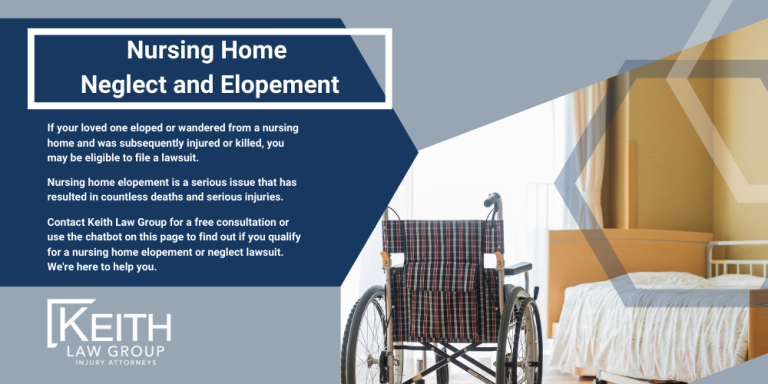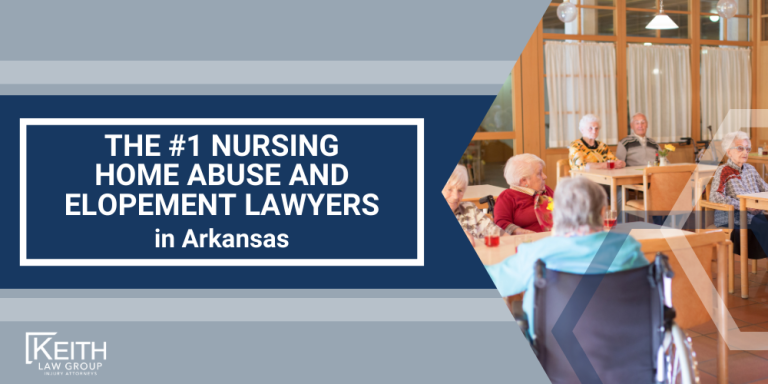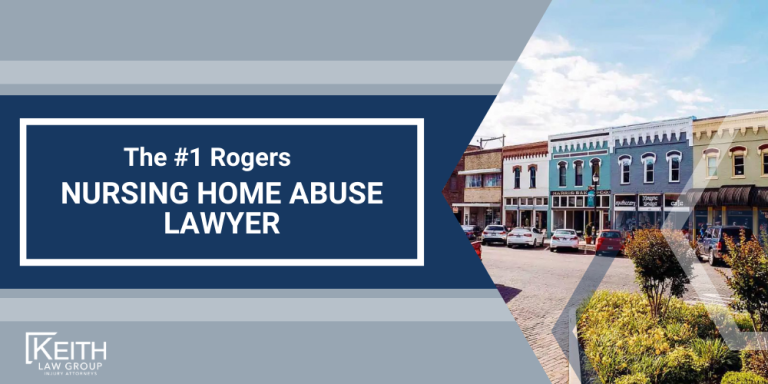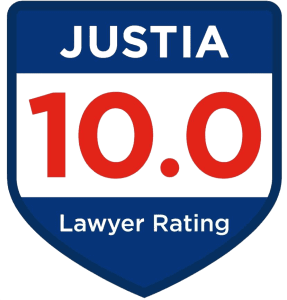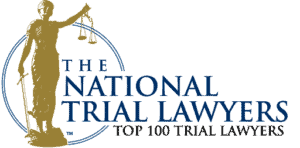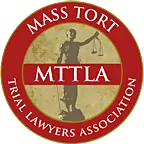- Last Updated: June 12th, 2025

Attorney Sean T. Keith has been a personal injury lawyer for 30+ years, a nationally recognized Top 100 Trial Lawyer, and top car accident lawyer & motor vehicle accident lawyer in Arkansas.
Legally Reviewed
This article has been written and reviewed for legal accuracy and clarity by the team of writers and attorneys at Keith Law Group and is as accurate as possible. This content should not be taken as legal advice from an attorney. If you would like to learn more about our owner and experienced injury lawyer, Sean T. Keith, you can do so here.
Fact-Checked
Keith Law Group does everything possible to make sure the information in this article is up to date and accurate. If you need specific legal advice about your case, contact us. This article should not be taken as advice from an attorney.
Sean Keith's Accollades & Practice Areas He Specializes In
- Over $20 Million recovered in Medical Device Injury Lawsuits.
- Over $13 Million recovered in Car Accident Lawsuits and other Motor Vehicle Accident Lawsuits.
- Over $100 Million recovered in total on behalf of clients.
- Sean represents clients in cases involving personal injuries, car accidents, motorcycle accidents, truck accidents, wrongful death, slip and falls, nursing home abuse cases, nursing home elopement cases, and more.
Nursing Home Abuse Lawsuit Filing Info
1 in 6 older adults experiences some form of abuse throughout their stay in a community setting, according to the World Health Organization (WHO).
Furthermore, the WHO found that 2 out of 3 nursing home and long-term care facility staff members admitted to abusing patients over the past few years.
These staggering statistics show that our elderly are some of the most vulnerable individuals in our society.
It’s no wonder that the number of nursing home abuse cases continues rising year after year.
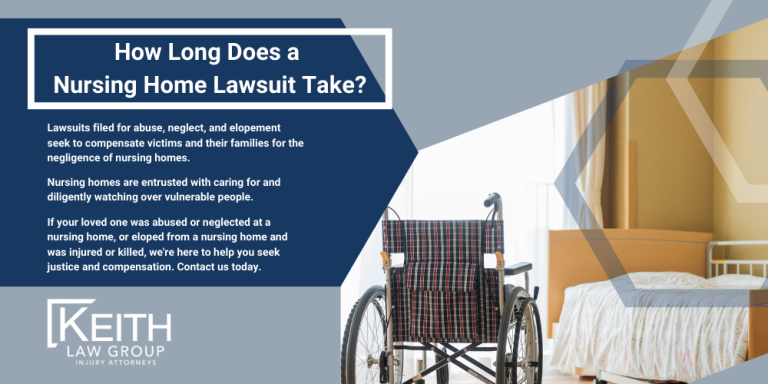
Question: How long does a nursing home abuse lawsuit take?
Unfortunately, resolving nursing home abuse lawsuits takes ample time.
It could take a plaintiff one (1) year or more to resolve their case successfully.
The length of time for litigation depends on several factors, such as the strength of evidence and the number of parties involved in the lawsuit.
If your loved one suffered abuse in a nursing home or assisted living facility, you may be eligible to file a nursing home abuse lawsuit and seek financial compensation.
Contact Keith Law Group for a free consultation.
You can also use our chatbot to receive a free, instant online case evaluation and find out if you qualify for legal action right now.
Our law firm has represented several victims of nursing home abuse, neglect and elopement.
We’re here to help victims and their family members pursue total financial recovery.
Reach out to us today for help with your nursing home abuse or wrongful death claim.
Table of Contents
What Factors Affect the Timeline of Your Nursing Home Negligence Lawsuit?
As mentioned, resolving a nursing home abuse case can take a year or more.
Several factors, like the nature of the injuries and the cooperation of both parties, play a crucial role in the timeliness of the case resolution.
In the following sections, we’ve outlined the most common factors affecting the timeline of a nursing home abuse case.
The Nature of the Injuries
The nature and severity of the injuries sustained by the nursing home resident can significantly impact the lawsuit.
If the injuries are extensive or life-threatening, the case may require more time for medical evaluations, treatments, and recovery before moving with legal proceedings.
Additionally, the extent of the injuries can affect the amount of compensation sought, which may lead to a more complex and time-consuming litigation process.
If your loved passed away and you are filing a wrongful death lawsuit, this could also impact the timeline of a lawsuit.
The Legal Process
The legal process itself can be lengthy and complex.
Nursing home lawsuits generally involve gathering evidence, filing complaints, discovery, negotiations, and potentially going to trial.
The timeline can be influenced by factors such as court schedules, availability of witnesses, and the complexity of the legal issues involved.
Each step of the process can add to the overall duration of the lawsuit.
Uncooperative Insurance Company
The involvement of an uncooperative insurance company can significantly impact the timeline and progress of a nursing home abuse lawsuit.
If the insurance company denies or delays coverage, it can lead to protracted negotiations, additional legal action, or even the need for a trial.
Resolving disputes with insurance companies can be time-consuming and may prolong the overall duration of the case.
The Complexity of the Case
The complexity of a nursing home abuse lawsuit can also affect the timeline.
Factors such as multiple defendants, complex legal issues, or challenges in obtaining evidence can lead to a more prolonged legal process.
Cases involving medical malpractice or intricate legal theories may require expert witnesses or extensive research, contributing to the length of the litigation.
What Are the Different Types of Nursing Home Abuse Lawsuits?
Whether your loved one is living in an assisted living facility or an independent living program, abuse can still occur.
Nursing home abuse exists in various forms, like physical abuse, psychological abuse, neglect or abandonment, elopement or wandering, and other forms of negligence.
Understanding the different forms of nursing home abuse will help you stay aware of the legal options you have to seek compensation on behalf of your loved one.
Tort-Based Lawsuit
A tort-based lawsuit is the most common type of nursing home abuse lawsuit.
It involves seeking compensation for harm or injuries caused by nursing home negligence, intentional misconduct, a medical malpractice case, or abuse by the nursing home staff or facility.
This can include physical abuse, emotional abuse, neglect, financial exploitation, or medical malpractice.
Also included is elopement and wandering, when a nursing home resident escapes from a nursing home and suffers serious injuries or death.
The plaintiff (the injured party or their representative) must prove that the nursing home breached its duty of care, which directly caused harm or injuries to the resident.
Breach of Contract
In some cases, elder abuse lawsuits may be based on breach of contract made by nursing homes.
When a resident enters a nursing home, they usually sign a contract outlining the terms and conditions of their stay and the level of care they should receive.
A breach of contract claim may be pursued if the nursing home fails to meet these contractual obligations, such as providing adequate care, safety, or services as promised.
The plaintiff must show that the nursing home’s failure to fulfill its contractual obligations resulted in harm or injury.
Wrongful Death
Wrongful death lawsuits can arise when a nursing home resident dies due to abuse, neglect, elopement, or misconduct.
These lawsuits are typically brought by the surviving family members or the estate of the deceased resident.
The plaintiffs must prove that the death was caused by the nursing home’s or its staff’s wrongful actions or omissions and that they are entitled to damages for losing their loved one.
What To Expect With Your Nursing Home Abuse Lawsuit
When pursuing a nursing home abuse lawsuit, the victim’s family members or personal representatives must understand that several factors can affect the case outcome.
Here are some important considerations to make when filing a nursing home abuse lawsuit:
- Expertise of Legal Representation: Hiring an experienced lawyer is critical as they will guide you through the legal process, assess the merits of your case, and provide advice on the best course of action.
- The Statute of Limitations: It’s crucial to be aware of the statute of limitations, which is the time limit within which a lawsuit must be filed. Failing to file within the prescribed time frame can result in losing your right to pursue legal action.
- The Amount and Quality of Evidence: The strength and amount of evidence you have can significantly impact your lawsuit. The more evidence you have, the better your chances of building a compelling case.
What Are the Steps in a Nursing Home Neglect or Abuse Lawsuit?
Filing a nursing home abuse case entails several steps, and it’s crucial to understand what happens in each stage of the process.
Below is a quick overview of what to expect when you initiate a nursing home abuse lawsuit.
Case Evaluation
The first step is to consult an experienced and reliable nursing home abuse lawyer.
An experienced attorney will evaluate the facts and circumstances of your case, including reviewing medical records, assessing the severity of the neglect or abuse, and determining the viability of the case.
They will also assess and consider the potential damages and financial losses you may be entitled to recover.
Formal Investigation
If your attorney determines your case has merit, they will initiate a formal investigation.
This may involve gathering evidence, such as medical records, medical bills, facility records, photographs, witness statements, and expert opinions.
The investigation aims to clearly understand the negligence or abuse that occurred and the harm caused to the resident.
Notice of Claim
In some jurisdictions, you may need to file a notice of claim before filing a lawsuit or provide a pre-suit notification to the nursing home facility or relevant parties.
This notice informs them of your intent to pursue legal action and may initiate negotiations or settlement discussions.
Filing of Lawsuit
If a settlement cannot be reached or if it is deemed necessary to proceed with a lawsuit, your attorney will file a formal complaint or petition with the appropriate court.
The complaint outlines the allegations, identifies the responsible parties, and details the damages sought.
The defendants will then be served with the complaint and have the opportunity to respond.
Settlement Negotiation
After the lawsuit is filed, the parties may engage in settlement negotiations.
This involves discussions and negotiations between your attorney, the nursing home’s legal representation, and potentially their insurance company.
The goal is to reach a mutually agreeable settlement that compensates you for the harm suffered without going to trial.
Settlement negotiations can occur at any stage of the lawsuit process.
Trial
The case will proceed to trial if a settlement cannot be reached.
During the trial, both sides will present their arguments, evidence, and witnesses to a judge or jury.
The judge or jury will evaluate the evidence, consider applicable laws, and determine liability and any awarded damages.
Gather Evidence for Your Nursing Home Abuse Lawsuit
In nursing home abuse lawsuits, various types of evidence can be used to support your claims.
Here are some examples of evidence commonly utilized in nursing home abuse cases:
- Medical Records: Medical records are vital evidence in nursing home abuse cases. They can provide documentation of injuries, medical treatments, changes in health conditions, medication administration, and any signs of neglect or abuse.
- Photographs and Videos: Visual evidence in pictures and videos can be powerful in demonstrating injuries, physical conditions, or neglectful situations. These may include photos of bruises, wounds, bedsores, unclean living conditions, or inadequate supervision.
- Witness Statements: Witness statements from residents, staff members, visitors, or other nursing home residents who have observed or have information about the abuse or neglect can be crucial evidence.
- Expert Opinions: Expert opinions from medical professionals or other experts in the field can be sought to evaluate the standard of care provided, assess the extent of injuries, and determine if neglect or abuse occurred.
- Financial Records: Financial records can be relevant in financial exploitation or fraud cases. They can demonstrate any unauthorized transactions, forged signatures, or other financial irregularities indicating exploitation by staff members or the facility.
What Damages Are Claimed in a Nursing Home Abuse Lawsuit?
In nursing home abuse cases, you may be eligible for various damages if you successfully prove your case.
The specific damages awarded will depend on the facts of your case and the laws in your jurisdiction.
Here are some common types of compensation you may be able to claim in nursing home abuse lawsuits:
- Compensatory Damages: Compensatory damages are intended to compensate the victim for the harm suffered due to abuse or neglect. These damages cover medical expenses, emotional distress, and pain and suffering.
- Punitive Damages: Punitive damages may be awarded in cases where the defendant’s conduct was particularly egregious, intentional, or grossly negligent. These damages are intended to punish the defendant and deter similar misconduct in the future.
- Wrongful Death Damages: If the nursing home abuse results in the resident’s death, the surviving family members may pursue wrongful death damages. These damages typically include compensation for funeral and burial expenses, loss of financial support, loss of companionship, and the emotional impact of the wrongful death.
Keith Law Group: Your Nursing Home Abuse Lawyers
If you suspect your loved one is suffering from abuse in a nursing home, don’t hesitate to contact the Keith Law Group immediately.
Our experienced attorneys will comprehensively evaluate your case and pursue legal action against the abusive staff member or the negligent nursing home management.
Don’t let abusers get away with their conduct. Hold them accountable and prevent future cases of abuse today.
Contact Keith Law Group for a free consultation.
Use our chatbot to receive a free, instant online case evaluation and find out if you qualify for legal action right now.
Frequently Asked Questions
-
How long does a nursing home abuse lawsuit take?
Unfortunately, resolving nursing home abuse lawsuits takes ample time.
It could take a plaintiff one (1) year or more to resolve their case successfully.
-
What is the Average Nursing Home Lawsuit Settlement?
Nursing home abuse settlements vary across cases and the average settlement agreement is dependent on the facts and evidence of an individual nursing home abuse lawsuit.
With that said, average nursing home abuse settlement amounts are often between $50,000 and $1,000,000 (or more).
This is by no means a guarantee of financial compensation in your nursing home abuse lawsuit or wrongful death claim.
These are merely estimates based on prior nursing home lawsuit settlements.
For more insight on your case and what you can expect for your nursing home settlement amounts, contact an experienced attorney.
-
How Much Does It Cost To Hire A Nursing Home Abuse Lawyer?
Keith Law Group works on a contingency fee basis.
This means that you are not charged for legal representation unless your case ends in your favor.
If your nursing home abuse lawsuit is unsuccessful, you pay nothing in legal fees.
Practice Areas
- 3M Earplug
- Belviq
- Bladder Sling
- Camp Lejeune Water Contamination
- Defective Medical Device
- Hernia Mesh
- Hip Replacement
- NEC Infant Formula
- Medtronic Insulin Pump
- Paraquat
- Philips CPAP
- Roundup
- Talcum Powder
- Tylenol Autism & ADHD
- Zantac
- Bicycle Accidents
- Boat Accidents
- Construction Accidents
- Dog Bite
- Drug Injuries
- Electric Shock Injuries
- Nursing Home Abuse
- Nursing Home Bedsore
- Nursing Home Falls
- Nursing Home Infection
- Nursing Home Sexual Abuse
- Personal Injuries
- Premises Liability
- Slip and Fall
- Traumatic Brain Injuries
- Wrongful Death
- 3M Earplug
- Belviq
- Bladder Sling
- Camp Lejeune Water Contamination
- Defective Medical Device
- Hernia Mesh
- Hip Replacement
- NEC Infant Formula
- Medtronic Insulin Pump
- Paraquat
- Philips CPAP
- Roundup
- Talcum Powder
- Tylenol Autism & ADHD
- Zantac
- Bicycle Accidents
- Boat Accidents
- Construction Accidents
- Dog Bite
- Drug Injuries
- Electric Shock Injuries
- Nursing Home Abuse
- Nursing Home Bedsore
- Nursing Home Falls
- Nursing Home Infection
- Nursing Home Sexual Abuse
- Personal Injuries
- Premises Liability
- Slip and Fall
- Traumatic Brain Injuries
- Wrongful Death
You pay
Nothing
unless we win
Do You Have A Case?

Choose Us For Your Personal Injury Case
- Available 24/7
- No Upfront Fees
- Free Case Evaluation
- No Fees Unless We Win!
